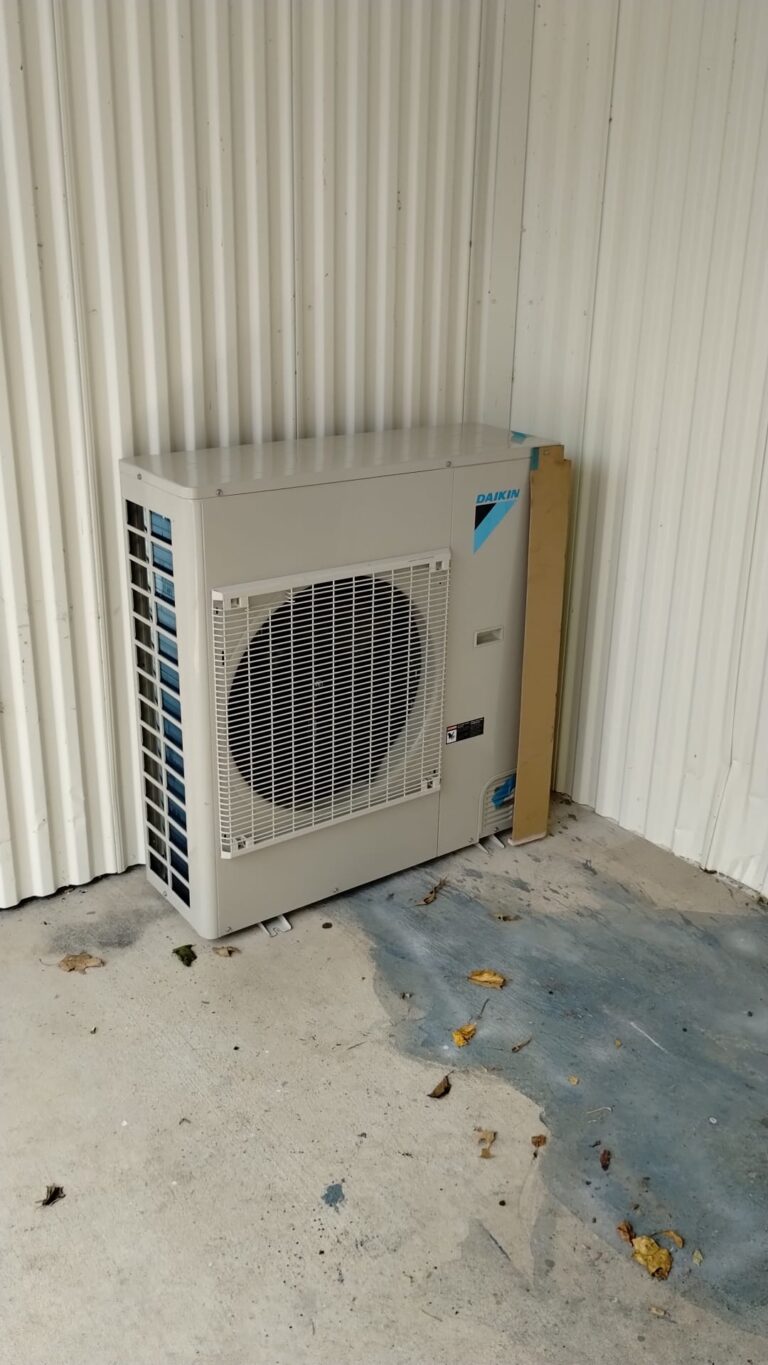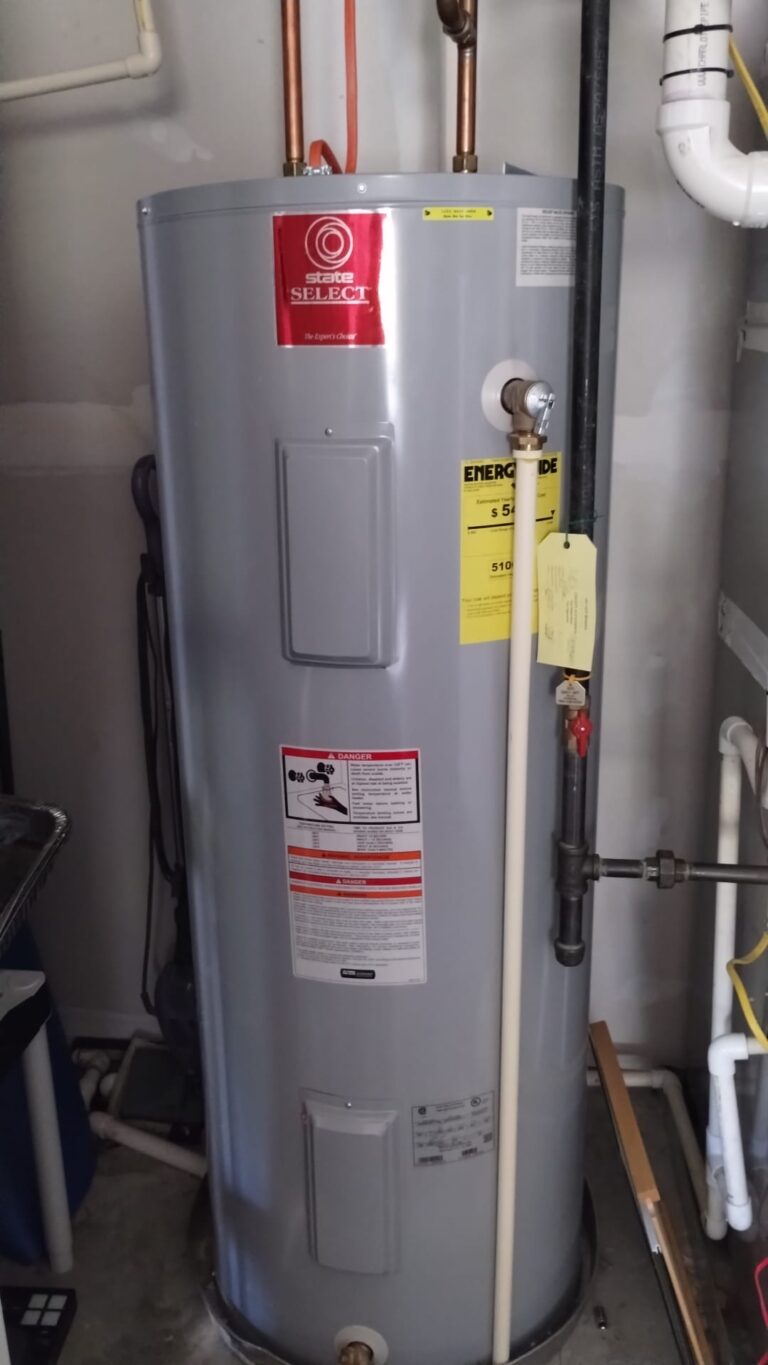Why is my Water Heater Leaking
Even more irritating than usual is not knowing why your water heater is leaking, which exacerbates the already stressful situation of having a leaky water heater. The difficulty of repairing a water heater leaking is exacerbated by the fact that homeowners in Manassas Park, Virginia frequently don’t know where to look or what to do. The moment your water heater leaks, you must, if at all possible, get it fixed quickly to safeguard your gas or electric water heater and avoid having hot water escape the tank or cold water enter the house through the cold water input pipe.
Additionally, homeowners should be concerned about leaks because they may suggest the need for a new hot water heater. Before making the expensive decision to replace their tank-style water heater, homeowners want to make sure the issue truly calls for one.
Advice on locating the source of a water heater leak is provided by Cool Breeze Services to homeowners. With the right eyes, identifying a leaky water heater is simple. It’s best to know where the leak is so you can lead the professionals and stop damage until they come, even though most repairs and replacements need a skilled plumber.

What to Do if the Water Heater Leaks?
The moment you discover a water heater leak, you should take action to prevent more damage to your house. Take the water heater’s power supply off. Turn off the electrical panel’s breaker if your model is electric. On the gas line that extends from your unit, locate the gas supply shutoff valve for gas water heaters. With the specialized shutdown valve on the line leading to your water heater, close the cold water inlet.
Determine where the water heater leak is located. For repairs, contact a plumber as soon as possible if the cause of the water heater leak cannot be fixed by hand.
Using paper towels, mops, and other tools, remove any water that may have gotten on the outside of the water heater to avoid causing further damage.
What’s Responsible for Water Heater Leaking?
There are several different causes of water heater leaks. The possibility of a leak exists in almost every part of an electric or gas water heater. It is not always easy to address all the reasons behind water leaks. Sometimes, all you have to fix is a loose part, like a drain valve. Sometimes, however, the entire water heater tank needs service. For a thorough diagnosis and water heater repair services, homeowners should always get in touch with a licensed plumber.
These factors most frequently cause water leaks from gas and electric water heaters in Virginia homes.
Drain valve
For appropriate maintenance inspections or replacements, the drain valve permits the hot water supply to exit the water heater tank. Along with cleaning out sediment, homeowners also use this to empty the water tank. A simple pipe wrench fix can stop water leaks caused by a slightly slack drain valve. In the event that the drain valve needs to be replaced because leaks from the base indicate that the valve isn’t waterproof. For this procedure, homeowners can either hire a plumber or install a new drain valve on the hot water tank.
Too much pressure
Since the water heater’s tank holds extremely hot water, pressure automatically arises in these units. During the water heating process, steam produced by hot water increases tank pressure. You can notice leaks from cracks, loose pieces, and other areas if the pressure within the hot water tank rises too high. There may be too much pressure if the water temperature is adjusted too high. Moreover, leaks occur in the tank when the inbound water pressure is too high. The hot water heater has the potential to burst if pressure builds up too much.
Faulty temperature pressure relief valve
Following a similar path, temperature and pressure relief valve, or T&P, issues lead to water heater leaks. There is more water pressure when there are problems with the T&P valve. Moreover, the component itself malfunctions or the valve loosens and produces leaks. Before replacing the T&P valve, make sure to reduce the tank’s pressure.
Internal tank leaks
Single tanks with two shells are found in water heaters. The outside shell, which is made of polyurethane foam or another insulating substance, offers insulation, while the inner shell holds the water. Each of the two shells is finally covered with a final coat of metal. An obvious leak from the exterior is not there if it develops on the inner shell due to aging or damage.
Old tank
The likelihood of leakage in older hot water heaters is higher than in more recent models. Especially if the homeowner utilizes the hot water supply excessively, the water heater will inevitably deteriorate over time. System lifetime is shortened by overuse. Additionally, rust gradually forms and causes leaks and corrosion. It is advisable to replace the hot water heater if its lifespan is nearing, as this will prevent complete failure and floods.
Sediment collection
More silt accumulates in the tank of a water heater owned by a homeowner over time. Frequently, this collection only serves to block the system and degrade the quality of the water. Yet, the tank deteriorates if the silt stays at the bottom of it for an abnormally long time. The water heater should be replaced when this kind of leak appears. In order to prevent this, it’s critical to clean the tank annually.
Inlet and outlet connections
Warm water can reach the fixtures in the house via the hot water outlet and cold water inlet pipes that are attached to the water heater. These pipes bring cold water into the system via the cold water supply line. Leaks occur where the pipes join the tank because these connections to the water supply line get loose over time. Using a pipe wrench to tighten these connections will resolve the problem.
Anode rod
The water heater’s anode rod draws anything corrosive in the water supply. This guarantees that corrosion will affect the rod rather than the water heater. The hot water heater tank’s metal begins to rust when the rod entirely corrodes, causing damage and a leaky water heater. You can quickly fix this water heater leak by replacing the anode rod, so make sure to look for significant corrosion there.
Cracked storage tank
Certain water heaters come with glass-lined storage water heater tanks as standard parts or as extra storage tanks. Storage tanks release heated water into the house when needed. For a larger hot water supply, they also expand the storage capacity. Minerals calcify and gather in the glass-lined models, resulting in leaks and cracks in the plumbing. Additionally, water expands when heated, which puts stress on glass and causes cracks. It is necessary to replace the water heater tank in each of these situations.
Establishing The Source of Your Leak
Finding the source of your water heater leak is now possible that you have turned off your main line, the supply from the cold line, and the gas or electricity.
Common Reasons for a Leaking Water Heater
Pressure relief valve damage or failure is the most frequent reason for water heater leaks. Hot water may begin to seep out of the water tank if this valve malfunctions, which keeps pressure from building up inside. Some such reasons could be:
- An eroded or fractured water heater tank
- Fittings and pipe connections that are loose or defective
- temperature and pressure relief valve that was not installed correctly
- aged anode rod to prevent corrosion in the hot water tank
Determining if one of these causes is behind your leak is important to make the necessary repairs yourself or to decide if you need to call a professional.
Water Leaking From The Top
The source of any pooling water at the top of your water heater could be any cold or hot water inlets that supply water to the tank for heating before it is released into your pipes when needed. Loose pipe connections may cause leaks from the top of your water heater.
One possible solution is to use a pipe wrench to tighten the cold and hot water input lines.
Water Leaking From The Side
Your temperature pressure relief valve is probably the source of the water leak coming from the side of your heater. Hot water and steam can escape the tank when excessive pressure builds up inside it thanks to the temperature pressure relief valve, a safety feature. The recommended course of action is to verify that the temperature is not higher than 120 degrees. If the temperature is properly adjusted but the leak persists, you need a new valve.
Water Leaking From The Bottom
The drain valve may be malfunctioning if water is leaking from your water heater’s base. When you need to empty the water tank, such as during maintenance, you should use the drain valve for this purpose.
Solution: Check for corrosion on the drain valve and replace it. Retighten the valve a little bit if there isn’t any corrosion, but careful—overtightening could lead to harm. If tightening doesn’t solve the problem, you may need to replace it.
Other Possible Issues
A broken anode rod or a crack could be the cause of any residual water that appears to be accumulating beneath your hot water heater. Calling a professional is often necessary to determine whether your problem is with your anode rod. Regretfully, if your hot water heater has a crack, you won’t fix the leak quickly. You will need a new water heater. Calling a professional to analyze the problem and decide on next measures is the best course of action in each of these cases.
How to Prevent Water Heater Leaks?
A leak in a water heater can damage more than just the machine itself. The longer water leaks occur, the greater the chance of flooding and water damage. The walls, floors, and items you own sustain water damage during floods. In addition, when water sits still for an extended period of time, mold and mildew can develop. Homes need to take precautions in order to avoid these severe damages. The following are a few steps that homeowners can take to stop water heater leaks.
Preventative maintenance
To best prevent leaks, have a plumber do annual maintenance checks. Plumbers inspect the whole plumbing system during maintenance visits. Clearly, the water heater is a part of this. Immediately fix any visible leaks in the water heater.
Drain and clean tank
Keep in mind to give the water heater a routine cleaning. Fully close the cold water inlet valve before opening the drain valve, and connect a garden hose to the drain valve to empty the tank of water. Take out any mold or mildew using a bleach-water solution. This guarantees that the tank won’t experience excessive sediment accumulation. Sediment accumulates at the tank’s bottom and creates fractures if you don’t routinely clear the water. Make sure to fully close the drain valve when opening the cold water inlet pipe.
Tighten loose parts
Using a wrench is another DIY project that homeowners finish themselves. Loose parts in water heaters are frequently simple to replace. Don’t forget to periodically verify the tightness of the parts.
Check the water heater frequently
Examine the entire water heater while you’re searching for any loose pieces. Note any water beneath the tank. How much colder is the surrounding air than the actual tank temperature? If so, condensation is probably causing the puddle. If this is the case, researchers need to conduct more investigations to rule out a leak as the cause.
Respond quickly
Act swiftly if you do find leaks in your water heater. You’ll experience less water damage the sooner you stop the leak. Furthermore, it could be hazardous if there are leaks from the pressure tank or the water heater itself. Addressing these concerns promptly can help reduce the likelihood of dire situations.
Avoid Future Issues with Regular Maintenance
Sediment or mineral deposits may have accumulated in your hot water heater, causing leakage even in the absence of any of the previously mentioned problems. One of the most crucial annual maintenance and preventive care tasks is flushing your water heater. By doing so, you can lessen the chance of a leak and prevent the need for expensive repairs brought on by accumulation.
It’s also important to routinely inspect your hot water heater for leaks or other damage to ensure optimal operation. To ensure that your hot water is safe to use, if you do discover a problem, get in touch with a specialist right away.
By taking the time to maintain your water heater and check for any signs of damage, you can avoid costly repairs due to a leaking system and keep your hot water running smoothly.
When Your Water Heater Leaks, Contact Cool Breeze Services
Although they need routine maintenance, water heaters are a necessary component of keeping our homes warm. It’s critical to respond swiftly if you see water leaking from your water heater. It could be time to have a water heater replacement from a professional if your water heater is more than ten years old or you find yourself needing repairs frequently. Check the system for obvious symptoms of damage.
Numerous benefits accompany a modern water heater:
- exceptional energy economy in heating
- enhanced safety components
- guarantee for energy savings
In the long run, the peace of mind and the long-term savings on monthly energy bills will outweigh the initial expense of a new water heater, regardless of whether it is a tank or tankless heater. If you are looking for HVAC or water heater leaking repair contact Cool Breeze Services.





